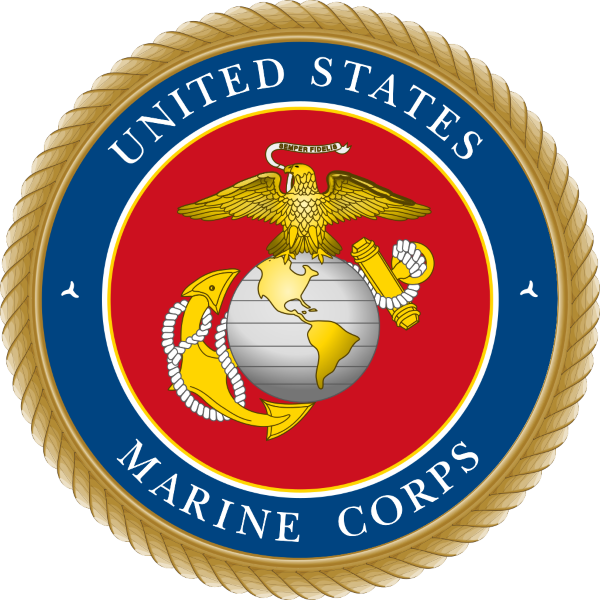The Marine Corps has many unique sayings that may have you scratching your head if you were never in the Marines.
Even after retiring from the military or returning to the civilian population, many Marines will still use the sayings or jargon they used while serving.
A famous saying is, once a Marine, always a Marine.
Sometimes Hollywood tries to make its movies more authentic by throwing in some of our commonly used phrases, and they get it completely wrong.
Also, the Marine Corps loves using acronyms, which rarely translate well to a normal conversation.
The 30 Marine Corps Sayings below will help you understand your loved ones and co-workers who served or the latest Hollywood blockbuster.
Related Article – 194 Common Military Terms / Slang / Jargon / Lingo
Table of Contents
1. Semper Fi
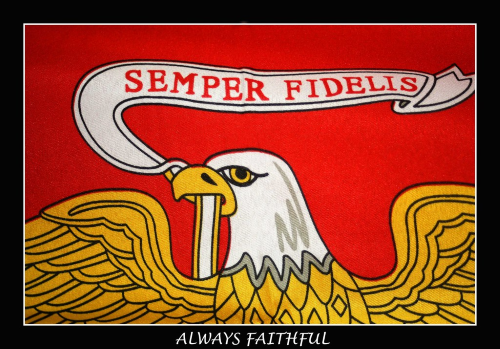
Semper Fi is one of the most common phrases a Marine will use, which is short for Semper Fidelis, which means “Always Faithful” in Latin.
The phrase shows the undying relationship that Marines have with one another on or off the battlefield.
The motto, created in 1883, promises that we will always win our nation’s battles.
2. Jarhead
Jarhead is a slang word for a Marine that appeared first during World War II by other military branches.
The original meaning comes from how Marines’ heads looked like mason jars when they wore their dress blue uniforms. It’s commonly used now to describe how Marines look when they have a crew cut or high and tight haircut.
3. Oorah
The official battle cry for the Marine Corps is “Oorah.”
It is not to be mistaken with the Army’s battle cry of “Hooah” and is a common mistake made by Hollywood.
The battle cry has many origin stories, but the primary one is that it came from the dive alarm from a submarine that sounded like “Aarugha.”
It was later used as a motivational comment.
4. Leatherneck
Leatherneck is another term used for “Marine.” The term originates from the leather neck straps that were a part of the Marine Corps uniform in the eighteenth and nineteenth centuries.
5. Devil Dog
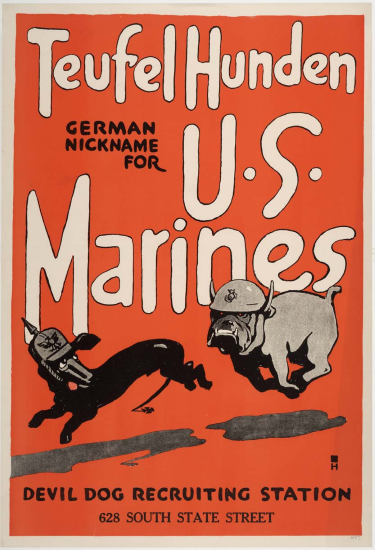
Devil Dog is a popular term used for Marines that originated during the battle of Belleau Wood during World War I.
The original term Teufel Hunden was given by German soldiers, which translates to Devil Dog.
It was used to describe the way Marines fought during the battle.
6. The Few. The Proud, The Marines
“The Few. The Proud, The Marines” is a recruiting slogan for the Marine Corps created in 1977 and is still used today.
The slogan reflects the character of Marines and their dedication to serving their country.
Here’s one of their earlier commercials from 2003:
7. Blood Stripe
A blood stripe is featured on the dress blue trousers for Officers, Staff Noncommissioned Officers, and Noncommissioned Officers.
It symbolizes the caliber of leadership these Marines displayed and the bloodshed during the Battle of Chapultepec in 1847 during the Mexican-American War.
8. Improvise, Adapt, Overcome
The slogan improvise, adapt, overcome reflects the mindset that every Marine needs to have to accomplish their mission.
During times of extreme hardship on and off the battlefield, Marines need to overcome any obstacle in their way.
The Marine Corps is the smallest military service in the Department of Defense with the smallest budget, and in modern times, this term reflects Marines doing more with less.
Another adaptation of improvise, adapt, and overcome is the slang phrase Semper Gumby, which means “Always Flexible.”
Related Article – Marine Rifleman’s Creed
9. Ninja Punch
Ninja Punch is a slang phrase for saying a Marine received non-judicial punishment.
This means a Marine was disciplined for not following the rules and regulations of the Uniform Code of Military Justice.
Offenses can be minor to severe, ranging from consistently showing up late for work to murder.
Based on the offense, Marines can face a reduction in rank, forfeiture in pay, extra duties, restriction to their living quarters or base, separation from service, or incarceration.
Punishment could also be a combination of the above.
Related Article – Half Right Face Explained (& Why Drill Sergeants Say It)
10. F.O.B.
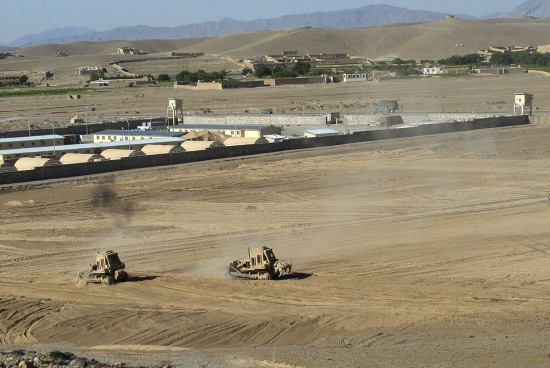
Another popular acronym is F.O.B., and it stands for forward operating base.
It is a forward military base used to complete strategic goals in an operating area.
Do not be like Hollywood and pronounce it by saying the letters.
Simply put, say Bob with an F instead of a B.
11. Fire Watch
While it may sound funny, Fire Watch is not the job of watching a fire, but rather a duty where a Marine is on shift for several hours.
During a fire watch, Marines are responsible for ensuring the security of an area and ensuring emergencies are reported and taken care of, such as a fire.
12. Warrior
The Army employs soldiers, and the Marines create warriors.
Every Marine is a Rifleman trained in the basic art of warfare, regardless of their job.
From Supply Marines to Infantry, all Marines are warriors.
Warrior is often a term used towards another Marine, much like Devil Dog.
13. Kill
Many would frown if someone replied to you with the word “Kill.”
While I can not tell you where it came from, the slang term kill is often used instead of “I understand” or acknowledging an order or statement.
14. Grunt
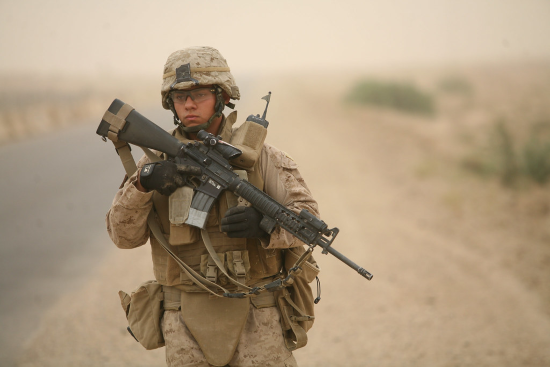
Grunt is a slang word for infantry Marines whose job description is to locate, close with, and destroy the enemy.
Everyone else who is not a Grunt is often called a POG or person other than Grunt.
Some feel that the term POG is derogatory, but if you have seen how a Grunt unit operates compared to another unit, such as communications, you will see an obvious difference.
15. Field Exercise
Field Exercise is another term not to be taken at face value since it does not refer to exercising in a field.
What it actually means is a training mission where Marines go to another location to simulate a deployed environment.
16. Field Day
Once a week, Marines will have a Field Day, when they will extensively clean their workspaces and living spaces to ensure health and cleanliness.
17. Rudder Steer
A rudder is a flatboard at the back of a boat used for steering.
The term rudder steer may be used to indicate a change of direction in a conversation or behavior.
18. Skating
Skating is a term used for Marines who are slacking off.
It can take many forms, but it simply means to avoid work or being tasked to work.
19. Go Fasters
Go Fasters is a slang word for the sneakers that recruits get issued during recruit training.
The term actually came from a formal naming convention used by Navajo Code Talkers.
Don’t believe me? Looking it up in the book Profiles in Hue by Demetria George.
20. Ink Stick
Ink stick is another term for a pen.
Its origins are the same as Go Fasters, which came from Navajo Code Talkers.
21. Water Walker
The term Water Walker is often used to describe a Marine who is a superstar at their job and appears to be the poster child for the Marine Corps.
A high physical fitness score, occupational proficiency, and a natural ability to lead make a Marine a Water Walker.
It refers to the Bible, where Jesus walked on water.
22. FUBAR
The PG version of FUBAR is messed up beyond all recognition.
It is often used to describe a situation that is a mess or an item that is severely damaged.
23. Uncommon Valor
The phrase “uncommon valor” was a common virtue that originated from Fleet Admiral Chester Nimitz during the Battle of Iwo Jima.
Twenty-two Marines were awarded the Medal of Honor for their actions and bravery during the Battle of Iwo Jima.
A quarter of all World War II Marine Medal of Honor recipients were awarded during the Battle of Iwo Jima.
24. Do One for Chesty
Lieutenant General Lewis Burwell “Chesty” Puller is the most decorated Marine in Marine Corps history.
From fighting guerillas during the Banana Wars to the Korean War, he led his Marines with a powerful leadership style.
When at your physical limits of doing a task, a Marine may say, “Do one for Chesty,” and you would push yourself past your limits out of respect for Chesty Puller.
Related Article – 20 Best Chesty Puller Quotes Of All Time
25. Boot
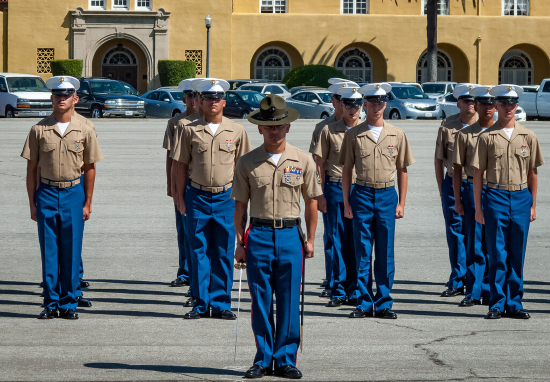
More senior Marines often call a junior Marine who just got out of recruit training a “boot.”
It is also common for Marines to call a junior Marine a boot when they join their first fleet unit.
After deploying, a boot might change to becoming a “salty” Marine.
“Salty” comes from the term salty dog, which is an ornery Marine who spent most of their life at sea.
26. BAMCIS
BAMCIS is an acronym for the six troop leadership steps for the Marine Corps.
- Begin the Planning
- Arrange for Reconnaissance
- Make Reconnaissance
- Complete the Planning
- Issue the Order
- Supervise
It is a collection of steps to assist leaders in making sound tactical decisions.
Some Marines may use the term BAMCIS, much like “Kill,” to acknowledge a task or statement.
27. Terminal Lance
A Terminal Lance is a Marine who gets out of the Marine Corps at the rank of Lance Corporal.
Most of the time, a Marine who gets out of the Marine Corps as a Lance Corporal either did not perform well or was reprimanded at some point in their career.
28. BCGs
The outdated and clunky eyeglasses issued to Marines during boot camp are called BCGs (birth control glasses).
The name comes from how big and ugly the glasses were — think Steve Urkel.
However, over the last few years, The Marine Corps went with a more modern frame, which looks way better than the classic BCGs.
29. Have A Plan to Kill
James “Mad Dog” Mattis is a retired General from the Marine Corps who later became the 26th Secretary of Defense.
A famous quote of his is:
“Be polite, be professional, but have a plan to kill everybody you meet.”
James Mattis is a popular figure in Marine Corps “pop culture,” where he is often depicted in memes and clothing.
30. Attacking in Another Direction
General Oliver Smith made the famous quote, “Retreat, hell! We’re not retreating, we’re just advancing in a different direction” during the Battle of Chosin Reservoir.
During the Korean War, over 120,000 Chinese soldiers overwhelmed Marines at the Battle of Chosin Reservoir.
The enemy had encircled the US forces, and Marines fought their way to their evacuation at Hungnam.
Conclusion
The above 30 Marine Corps sayings are some of the most popular sayings in the Marine Corps, but there are many more that did not make the list.
The Marine Corps has unique jargon, slang, and sayings that could be challenging to outsiders, but hopefully, after reading this article, you will have a better understanding of some of our more popular phrases.
- 10 Best Tactical Vests - June 24, 2024
- 7 Best Tactical Fanny Packs For Concealed Carry - June 20, 2024
- 10 Best Military Tactical Sunglasses - June 20, 2024

